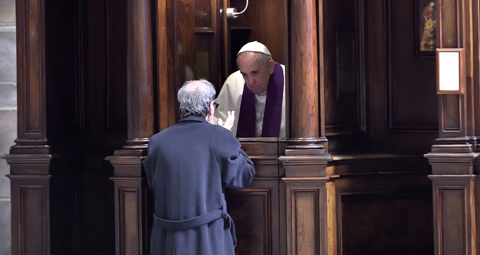February 8 | ![]() 0 COMMENTS
0 COMMENTS ![]() print
print

The secular zeal undermining the Sacrament of Confession
GERALD WARNER explores why the Sacrament is under threat in Australia
IN a global environment where Catholics are martyred for their Faith almost daily and Western governments pursue an aggressively anti-Christian agenda, it should come as no shock to discover that yet another front has been opened in secularism’s relentless war on the Church. This time the target is one of the most sacred sacramental attributes of Catholicism: the Seal of the Confessional.
Australia is where this latest assault is originating, but we may be confident that, if not met with total, intransigent resistance, this sacrilegious offensive will soon spread further afield.
In Australia, three provinces—the Australian Capital Territory (ACT), South Australia and Tasmania—have already passed laws requiring priests to report to the authorities admissions of child sex abuse they have heard in sacramental confession. The state of Victoria has hesitated to follow suit.
This totalitarian legislation was one of the 317 recommendations made by the Australian Royal Commission into Institutional Responses to Child Sexual Abuse, with which the Church authorities are largely in agreement—they have accepted 98 per cent of the recommendations.
But the notion that the seal of the Confessional can ever, for any purpose whatsoever, be breached is totally unacceptable in Catholic doctrine and Canon Law.
Australian priests have insisted they will go to prison, if necessary, rather than commit sacrilege. The penalty for revealing anything learned in confession is automatic excommunication, from which only the Pope can absolve a priest. Anything less would be intolerable.
The pretext of child protection advanced by the Royal Commission to justify its attack on the Church—for that is what was intended—is hypocritical. Why not make the same legal demand regarding confessions of murder?
The whole point about the seal of the Confessional is its blanket inviolability: the most minor venial sin confessed enjoys the same protection as admissions of mass murder. There are no shades of secrecy.
In the Sacrament of Penance the penitent confesses to Our Lord and, if the requisite conditions are met, is pardoned by Him: the priest is only an intermediary. His presence is necessary, however, so that the conditions of contrition, confession and satisfaction may properly be monitored, a penance administered and absolution formally granted.
The non-Catholic notion of confessing one’s sins mentally to God and then assuming His forgiveness amounts to no more than a psychological self-help mental exercise.
The painful experience of confessing aloud to another human being one’s most shameful thoughts, words and deeds is a demanding requirement. It is typical of the robustness that underlies Catholic practices in a religion that makes real demands on the faithful and requires action as well as words.
No secular authority has the remotest right to interfere in that very personal encounter between a contrite sinner and God. The Church has a duty to assert the privacy of the confessional and, happily, in Australia it is doing so vigorously.
Archbishop Prowse of Canberra and Goulburn said: “Priests are bound by a sacred vow to maintain the seal of the confession. Without that vow, who would be willing to unburden themselves of their sins, seek the wise counsel of a priest and receive the merciful forgiveness of God?”
He also denounced the law as an attack on religious freedom. Archbishop Coleridge of Brisbane has been similarly outspoken, along with other members of the Australian hierarchy. Priests themselves have been extremely firm in their response, saying they will go to prison rather than commit sacrilege.
They have also expressed concern that, to secure convictions, the authorities might sacrilegiously employ bogus penitents to entrap priests.
The Royal Commission’s anti-Catholic bias was further revealed by its impertinent recommendation to make priestly celibacy voluntary—an idea again rejected by the Pope on January 29—with a slanderous reference to ‘the potential psychological and sexual dysfunction associated with a celibate rule of religious life.’
A Catholic website pointed out the Commission’s own report revealed that the Anglican Church in Australia, with no rule of celibacy, had almost 1,100 child sexual abuse claims over the past 35 years.
The seal of the confessional is one of the glories of the Church and a crucial path to salvation. Over the centuries priests have endured torture and death rather than violate its secrecy.
The proto-martyr of the seal of the confessional is St John of Nepomuk, martyred at Prague in 1393. The details are obscure but it is generally supposed he refused to reveal the confession of the Queen of Bohemia, suspected of adultery by her husband.
We can expect the confessional seal to come under attack from the Church’s enemies in many other countries, including our own.
If so, we must employ implacable resistance: sacramental secrecy is non-negotiable and we must support our priests in maintaining that precious confidentiality between man and God.










